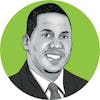 See
more of the story
See
more of the story
Nearly 30 years ago at my grandfather's 70th birthday celebration, the steely man thrust his hands into the air after a slide show presentation about his life.
"Look at his hands!" my Aunt Sarah shouted to the room full of relatives who'd assembled to honor Melvin Medcalf, my father's father. "That's from years of hard work."
My grandfather preached the value of grit, which defined his life. In the scorched cotton fields of Baldwyn, Miss., my grandfather labored for 50 cents per day as a sharecropper on a white man's farm in the '30s, '40s and '50s.
I've always carried that image of his worn, callused palms as a reminder of the system of racism, discrimination and inequality in the Jim Crow South that never allowed him to earn his full worth.
In May, I thought about the continued devaluation of Black bodies when I watched the video of George Floyd's killing. Floyd's hands were handcuffed behind his back as he made a futile cry for compassion from a quartet of Minneapolis police officers.
Upon both their deaths — my grandfather's in 1996 and Floyd's five months ago — I considered the same question: Had those Black men ever felt valued in this life?
When Star Tribune editor Rene Sanchez and I first spoke about this column, we discussed a collective vision centered on using this piece — in a newspaper I know well — to highlight diverse perspectives at this crucial time. I told him about Eugene Kane, my hero and a Black journalist who wrote about his experiences for my hometown newspaper, the Milwaukee Journal Sentinel. Kane, who inspired me to pursue a career in journalism, died in April.
As a young African American, I had the luxury of reading Kane's powerful columns, and I wondered if I could have a similar impact on those who've felt overlooked in this state. Kane's words fueled my path from Milwaukee to Minnesota State Mankato to the Star Tribune, where I worked for several years as a news and sports reporter.
The Star Tribune's reputation has served as a catalyst for the fortune I've enjoyed thus far in my career. I'm grateful for everything I learned here. But I'd also questioned the publication's investment in stories about underrepresented communities that do not involve violence, poverty or achievement gaps. When I read my newspaper, I also wondered if Black people who didn't average 22 points per game could build a fruitful life in the Twin Cities. It wasn't a professional risk I was willing to take.
As a father of three daughters, I stayed in the Twin Cities to remain closer to them. But I left for ESPN in 2011, a professional departure from the Twin Cities to Bristol, Conn., in part because I wondered if I would run into the same hurdles as other African Americans I knew in the area. At ESPN, I found an outlet that promoted diversity in ways I'd never witnessed. There are women, white and nonwhite, African Americans, Hispanic Americans, Asian Americans and other representatives of minority groups who hold leadership positions at all levels. And I found comfort in that reality, a contrast to my experiences in Minnesota.
To be Black in Minnesota is to constantly barter for acceptance, promotion and acknowledgment in exchange for a minimized version of yourself. That's why I am here, as the first African American man afforded this platform at the Star Tribune, to facilitate a conversation about value and its meaning to underrepresented communities. From my perspective, value often feels like something you have to earn here when you're not white. Value seems conditional.
The most important change Floyd's death can produce for this state is a collective consideration of each individual's inherent value.
Through nearly 20 years in this state, I've learned that Minnesota Nice is a friendly phrase that's foreign to some of us who aren't white. That wave from a stranger on a walk around a local lake can also mask the suspicious glares I've experienced in affluent neighborhoods. The minorities who desire a welcome mat are often asked to shrink in a place that traffics in the suppression of nonwhite experiences. I also live in a place where many would rather avoid a discussion about the overt contributors to the economy of inequality that affected my grandfather's life and placed a knee on Floyd's neck long before he lost his life.
But I recognize that this is an opportune time to construct a path toward lasting change. We're all stuck in this unprecedented chapter, where the threat of a deadly virus, an uncertain financial climate, the painful distance from those we love and the aftermath of Floyd's death have allowed people from a variety of backgrounds to grieve together.
After Floyd's death, people throughout this state and country promised to engage in the introspection that's necessary to turn the emotions of recent months into real progress.
I hope to use this column to expand and extend the conversation.
As a Black man living in the Twin Cities, I hope my perspective matters, not based on my delivery or credentials, but my humanity.
I might fail, but I feel compelled to try.
My ambitions are selfish.
If I'm ever granted the gift of reflection later in life, I'd like to tell my daughters this column was an attempt to fertilize the ground beneath their feet. Their futures, and the futures of children throughout this state, are now in our hands.
Today Myron Medcalf debuts as a local columnist for the Star Tribune.




